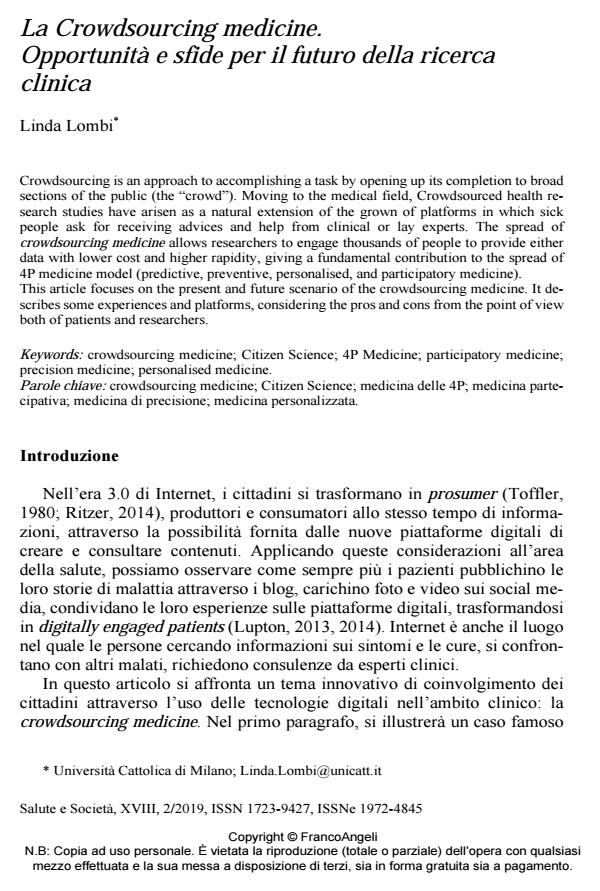La Crowdsourcing medicine. Opportunità e sfide per il futuro della ricerca clinica
Titolo Rivista SALUTE E SOCIETÀ
Autori/Curatori Linda Lombi
Anno di pubblicazione 2019 Fascicolo 2019/2
Lingua Italiano Numero pagine 18 P. 98-115 Dimensione file 221 KB
DOI 10.3280/SES2019-002009
Il DOI è il codice a barre della proprietà intellettuale: per saperne di più
clicca qui
Qui sotto puoi vedere in anteprima la prima pagina di questo articolo.
Se questo articolo ti interessa, lo puoi acquistare (e scaricare in formato pdf) seguendo le facili indicazioni per acquistare il download credit. Acquista Download Credits per scaricare questo Articolo in formato PDF

FrancoAngeli è membro della Publishers International Linking Association, Inc (PILA)associazione indipendente e non profit per facilitare (attraverso i servizi tecnologici implementati da CrossRef.org) l’accesso degli studiosi ai contenuti digitali nelle pubblicazioni professionali e scientifiche
Crowdsourcing is an approach to accomplishing a task by opening up its completion to broad sections of the public (the "crowd"). Moving to the medical field, Crowdsourced health re-search studies have arisen as a natural extension of the grown of platforms in which sick peo-ple ask for receiving advices and help from clinical or lay experts. The spread of crowdsourc-ing medicine allows researchers to engage thousands of people to provide either data with lower cost and higher rapidity, giving a fundamental contribution to the spread of 4P medicine model (predictive, preventive, personalised, and participatory medicine). This article focuses on the present and future scenario of the crowdsourcing medicine. It de-scribes some experiences and platforms, considering the pros and cons from the point of view both of patients and researchers.
Parole chiave:Crowdsourcing medicine; Citizen Science; medicina delle 4P; medicina parteci-pativa; medicina di precisione; medicina personalizzata.
- Health and Illness in the Neoliberal Era in Europe Linda Lombi, Luca Mori, pp.91 (ISBN:978-1-83909-120-9)
Linda Lombi, La Crowdsourcing medicine. Opportunità e sfide per il futuro della ricerca clinica in "SALUTE E SOCIETÀ" 2/2019, pp 98-115, DOI: 10.3280/SES2019-002009